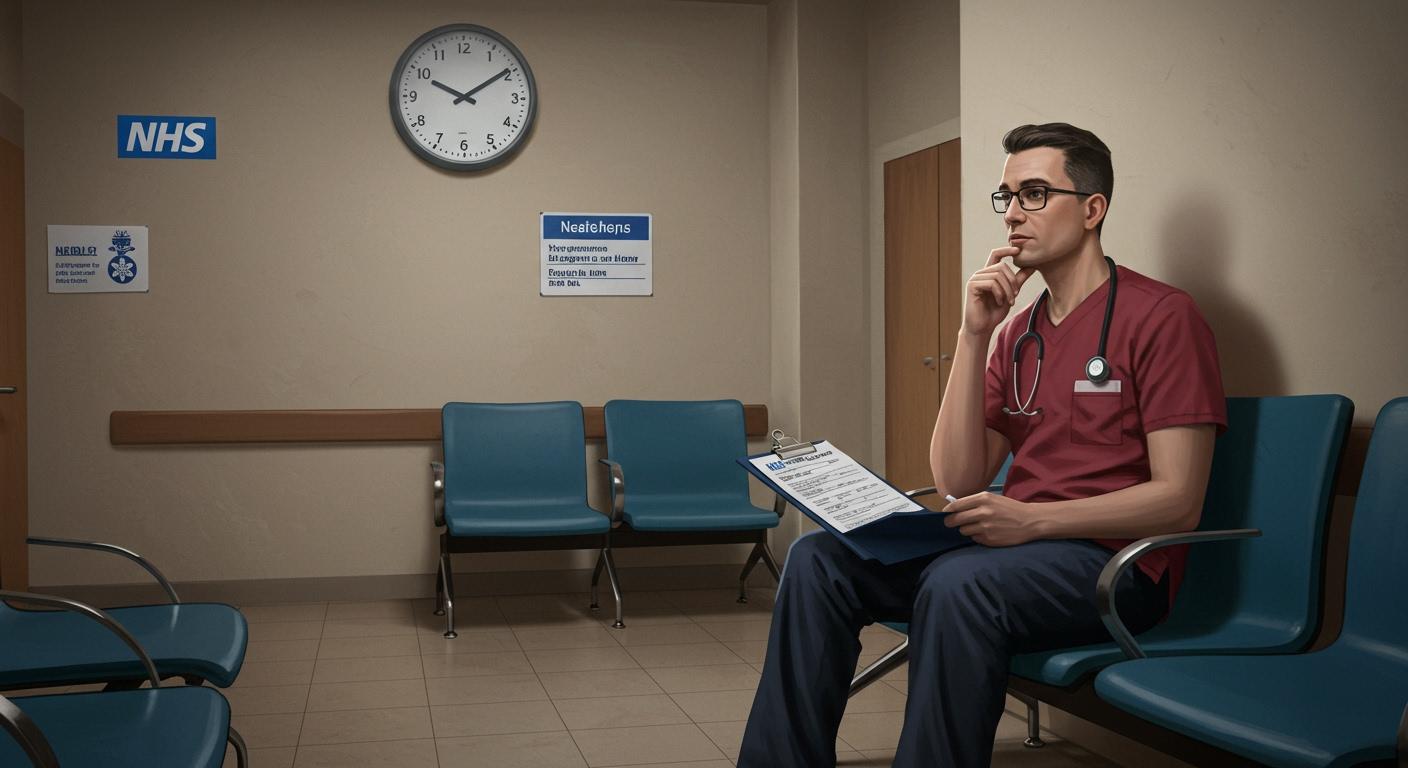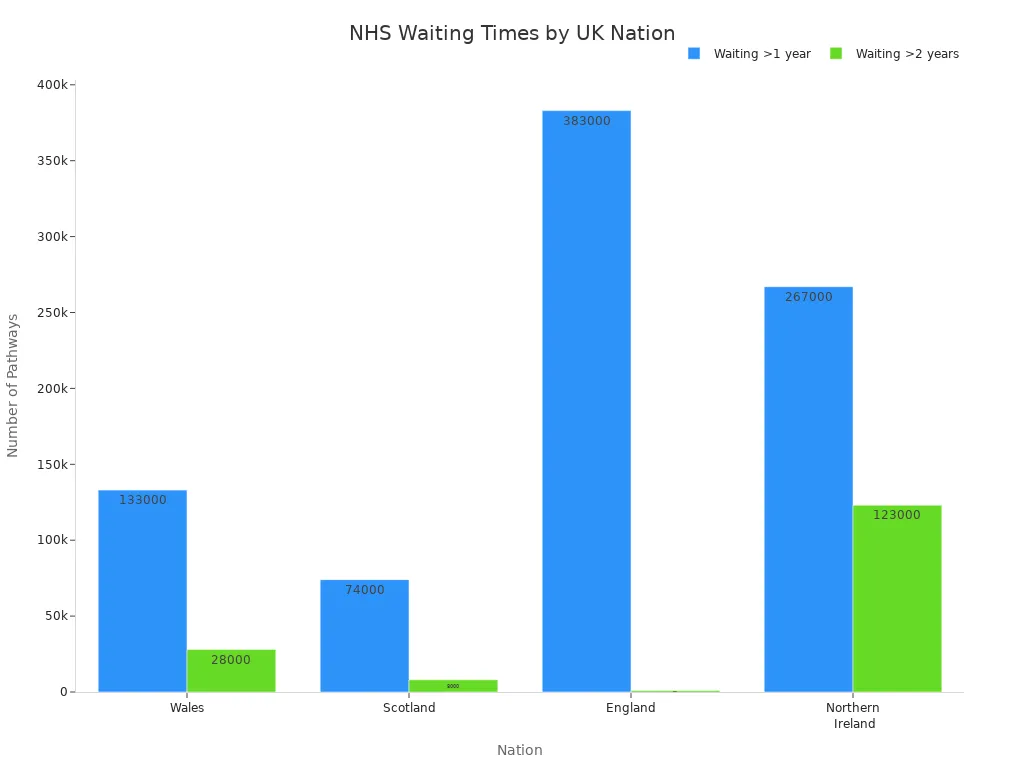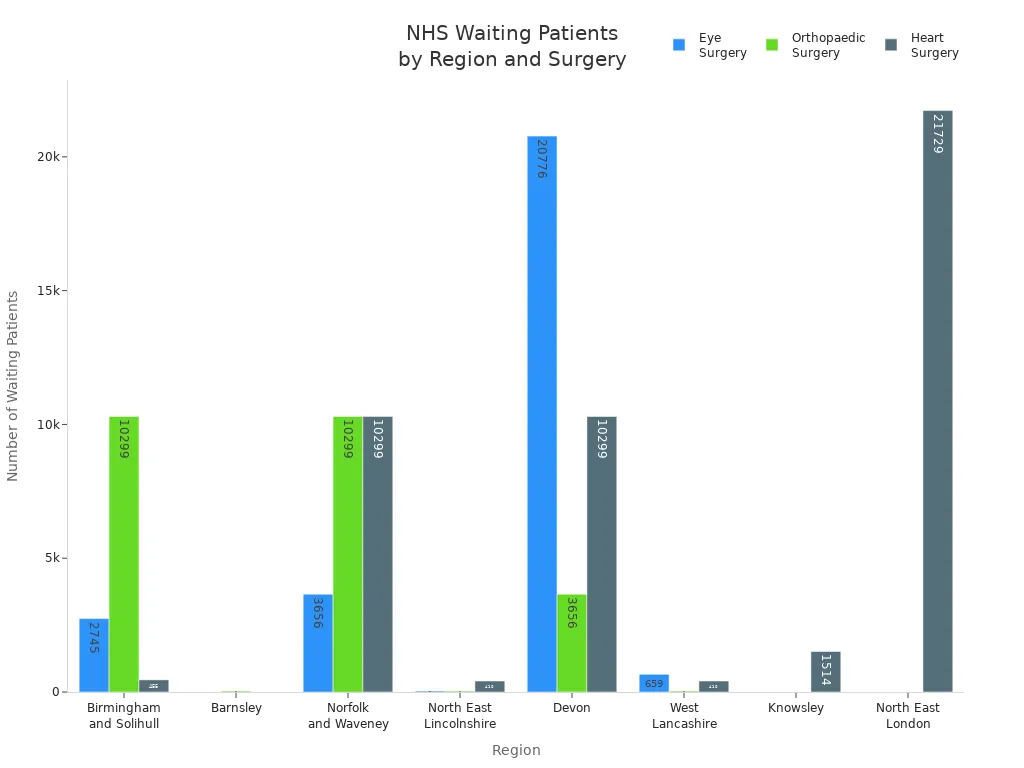NHS waiting times for non urgent surgery explained simply

You might wonder how long you will wait for non-urgent surgery with the nhs. The nhs sets an 18-week standard from referral to treatment. Right now, only about 59% of patients start treatment within this time. About 3.1 million people are waiting longer than 18 weeks. nhs waiting times for non urgent surgery can change depending on where you live and the type of surgery you need. The nhs works hard to help everyone, but sometimes delays happen. You are not alone if you find yourself waiting.
Key Takeaways
The NHS tries to treat most patients in 18 weeks. Right now, only 59% get treated in this time. Knowing this can help you understand what to expect.
If you wait a long time, you are not the only one. Many people have delays. The NHS knows about these problems and is trying to fix them.
You can choose which hospital does your surgery. If your wait is too long, ask your GP to send you to another hospital. Some hospitals have shorter waits.
You can join a cancellation list at your hospital. This might help you get treated sooner if someone cancels their spot.
You can look at private surgery if you want faster treatment. It costs more money, but you wait less and can pick your specialist.
What is non-urgent surgery?
Definition
Doctors talk about different types of surgery. Some operations do not need to happen right away. Non-urgent surgery means you are not in a medical emergency. Doctors plan this kind of operation before it happens. You have time to get ready. Your health is not in danger if you wait. The NHS gives clear definitions so you can tell the difference:
Type of Surgery | Definition |
|---|---|
Non-Urgent Surgery | Surgery that does not involve a medical emergency and is scheduled in advance (Elective Surgery). |
Urgent Surgery | Surgery that can wait until you are medically stable, but should generally be done within 2 days. |
Emergency Surgery | Surgery that must be performed without delay to avoid permanent disability or death. |
Tip: If your doctor says your operation is "elective," it usually means it is non-urgent.
Examples
You might ask what operations are non-urgent. Many common procedures are in this group. Here are some examples you may know:
Specific Operation Type | Generic Operation Type |
|---|---|
Wisdom tooth | |
Total cholecystectomy NEC | Cholecystectomy |
Total abdominal hysterectomy NEC | Hysterectomy |
Repair of recurrent inguinal hernia using insert of prosthetic material | Inguinal hernia (IH) repair |
Repair of umbilical hernia using insert of prosthetic material | Umbilical hernia (UH) repair |
Primary total prosthetic replacement of hip joint using cement | Total hip replacement (THR) |
Primary total prosthetic replacement of knee joint using cement | Total knee replacement (TKR) |
You may need one of these operations if you have pain or problems that make daily life hard. Non-urgent surgery helps you feel better, but you do not need it right away to stay safe.
NHS waiting times for non urgent surgery
Statistics
You may wonder how long you will wait for your operation. The NHS sets a standard for non-urgent surgery. You should start treatment within 18 weeks from your referral. This is called the 18-week standard. If you wait longer than this, it counts as a breach. Right now, only 59% of patients receive their surgery within this time. The NHS aims for 92%, so this is much lower than the target.
You can see how this has changed over the years:
Five years ago, most people received their surgery within 18 weeks.
Now, fewer people get treatment on time because of record waiting lists and staff shortages.
Many people face delays that last months or even years.
Here is a quick look at the current numbers:
Target | Current Performance | NHS Goal |
|---|---|---|
18-week standard | 59% treated within 18 weeks | 92% |
Note: If you wait more than 18 weeks, your case is a breach of the NHS waiting time standard.
Current NHS waiting list
The current NHS waiting list for non-urgent surgery is very large. As of the end of 2024-25, about 800,000 people are waiting for their operation. This number is more than double what it was in 2013, when only 383,000 people waited. The COVID-19 pandemic made things worse, causing a sharp rise in surgery waiting times.
You may also want to know how long some people have waited. In March 2022, over 70,000 people had waited more than two years for surgery. By March 2025, this dropped to around 8,000. The number of people waiting more than one year peaked at over 183,000 in August 2022.
Waiting times for operations are not the same everywhere. Here is a table showing how many people in each UK nation have waited more than one year or even two years for surgery:
Nation | Pathways waiting more than 1 year | Pathways waiting more than 2 years |
|---|---|---|
Wales | 28,000 | |
Scotland | 74,000 | 8,000 |
England | 383,000 | <1,000 |
Northern Ireland | 267,000 | 123,000 |

In Wales, almost half of all patients have waited over a year for surgery. In Scotland, about one in four have waited this long. In England, nearly one in five people face these long delays.
Breaches and backlogs
You may ask why so many people face delays. Several reasons cause breaches of the 18-week standard for NHS surgery. The main causes include:
Factor | Description |
|---|---|
Referral-to-Treatment Delays | Slow conversion of referrals into appointments leads to longer waits before you join the list. |
By late 2024, over 3 million patients waited longer than 18 weeks, with nearly 200,000 over a year. | |
Last-Minute Cancellations | Cancellations disrupt schedules and push back surgery for those with lower clinical priority. |
Other reasons for delays include:
Staffing shortages in hospitals
Operational pressures from events like the COVID-19 pandemic
Delays in the referral-to-treatment process
These problems mean that many people wait much longer than they should. You may find your surgery wait times stretch far beyond the NHS target. Some people now wait up to 85 weeks for their operation. Delays can cause pain, worry, and disruption to your daily life.
Tip: If you face long delays, you are not alone. The NHS knows about these problems and works to reduce surgery waiting times. You can ask your hospital for updates or explore other options if your wait feels too long.
Why NHS waiting times vary
Location
Where you live can change how long you wait for surgery. Some regions have more patients waiting than others. For example, if you live in Devon, you might see over 20,000 people waiting for eye surgery. In Barnsley, only a few people wait for the same operation. This difference happens across many types of surgery, such as orthopaedic and heart surgery.
Region | Waiting Patients for Eye Surgery | Waiting Patients for Orthopaedic Surgery | Waiting Patients for Heart Surgery |
|---|---|---|---|
Birmingham and Solihull | 2,745 | 10,299 | 455 |
Barnsley | 2 | 36 | 1 |
Norfolk and Waveney | 3,656 | 10,299 | 10,299 |
North East Lincolnshire | 36 | 36 | 410 |
Devon | 20,776 | 3,656 | 10,299 |
West Lancashire | 659 | 36 | 410 |
Knowsley | N/A | N/A | 1,514 |
North East London | N/A | N/A | 21,729 |

You may also notice that people with lower income or less education often wait longer for nhs surgery. If you have a university degree, you are likely to wait less time than someone without qualifications. This shows that education and income can affect your place on the waiting list.
Note: Where you live and your background can both play a big part in how soon you get your operation.
Type of surgery
The kind of surgery you need also changes your waiting time. Some operations, like heart surgery, may get priority if your health could get worse quickly. Other types, such as hip or knee replacements, often have longer waits because they are common and not always urgent.
You might see that some regions have thousands waiting for orthopaedic surgery, while others have fewer. Eye surgery can also have long lists in some areas. The nhs tries to help those with the most urgent needs first, so your wait depends on the type of operation and how serious your condition is.
NHS pressures
Many things put pressure on the nhs and make waiting times longer. You may face delays because of:
Not enough beds for patients after their operation
Problems with hospital systems, such as blocked beds or poor planning
These issues mean that even if you are ready for surgery, you might still wait. The nhs works hard to fix these problems, but they can take time to solve.
If you feel your wait is too long, you can ask your hospital for updates or look for other ways to get your surgery sooner.
NHS process and waiting list
Referral steps
When your doctor decides you need non-urgent surgery, they will send a referral to the hospital. The nhs calls this an elective procedure. This means you do not need the operation right away, so you can plan for it in advance. The nhs aims to start your treatment within 18 weeks from the date of your referral. Sometimes, you may wait longer because of high demand or delays caused by the COVID-19 pandemic. After your referral, the hospital will review your case and add you to the waiting list for surgery.
What happens while waiting
You may feel worried or frustrated while you wait for your surgery. Hospitals try to keep you informed about your place on the list. You might get letters or phone calls with updates. If your symptoms change or get worse, you should tell your doctor or the hospital team. They can check if your surgery needs to happen sooner. Some hospitals offer support, such as advice on managing pain or staying active. You can use this time to prepare for your operation and ask questions about what will happen on the day.
Tip: Keep a diary of your symptoms and any changes in your health. This can help your doctor decide if your surgery should move up the list.
Tracking your place
You can use different tools to track your progress while you wait for surgery. Many hospitals now offer digital health apps. These apps let you set goals and keep track of your symptoms. You can also:
Complete regular health assessments to stay updated about your condition.
Use remote monitoring so your healthcare team can check your vital signs.
Respond to Patient-Reported Outcome Measures (PROMs) from home.
View your test results and manage your appointments online.
These tools help you stay involved in your care and spot any problems early. If you have questions about your place on the waiting list, you can contact your hospital for more information.
If your wait is long
Getting updates
You do not have to wait in silence. You can take steps to stay informed about your surgery.
Use the NHS e-Referral system. This lets you compare hospitals and choose one with a shorter waiting time.
Ask your hospital about cancellation lists. If someone cancels, you might get their slot at short notice.
Keep in touch with the hospital booking team. Regular contact helps you hear about any new openings.
Tip: Staying proactive can help you find a sooner date for your operation.
Right to Choose
You have the Right to Choose where you receive your NHS treatment. If your wait feels too long, you can ask your GP to refer you to a different hospital or specialist. This right gives you more control and may help you get treated faster.
StopWaiting
StopWaiting.co.uk is a service that helps you use your Right to Choose. For a one-off fee, they handle the paperwork and find hospitals with shorter waiting times. This can save you time and reduce stress if you feel overwhelmed by the process.
Other options
You can also consider other ways to speed up your surgery:
Ask to join a cancellation list at your hospital.
Look into private surgery if you want faster treatment.
Private surgery offers quick access and lets you choose your specialist. Many people choose this route when NHS waits affect their daily life or health. For example, hip replacements cost between £11,676 and £14,050, while knee replacements range from £13,050 to £14,850.
Disadvantages of Private Surgery | |
|---|---|
Shorter waiting times | High costs |
Choice of specialist | Not always full aftercare |
Access to new treatments | Quality can vary |
You do not have to wait for years. You have choices. Take action and explore your options to get the care you need sooner.
You might wait a long time for non-urgent NHS surgery. Here are some important things to know:
The NHS wants 92% of patients treated in 18 weeks, but only 57% get this.
Waiting can make you hurt and feel worse in daily life.
You can get help from UK private healthcare, medical tourism, or Vital Global Care to find quicker treatment.
David’s story shows that doing something can help you get better results. You can look at private clinics or have surgery in another country.
Option | Benefit |
|---|---|
Quicker treatment | |
Private sector involvement | Less waiting |
Medical tourism | Cheaper, safe care |
You can make choices about your health. Ask questions, get help, and pick what works best for you.
FAQ
How can you check your position on the NHS waiting list?
You can contact your hospital’s booking team by phone or email. Some hospitals offer online portals or apps. Ask your GP if you need help.
Tip: Keep your NHS number handy when you ask for updates.
What should you do if your symptoms get worse while waiting?
Tell your GP or hospital team straight away. They can review your case and may move you up the list if your condition changes.
Always report new pain, swelling, or other changes in your health.
Can you choose a different hospital to get surgery faster?
Yes, you have the Right to Choose. Ask your GP to refer you to another hospital with a shorter wait.
Use the NHS e-Referral system to compare waiting times.
Services like StopWaiting.co.uk can help with the process.
Is private surgery safe in the UK?
Private hospitals in the UK follow strict safety rules. You can check ratings on the Care Quality Commission (CQC) website.
Always research the hospital and surgeon before booking your procedure.
See Also
Ways To Bypass NHS Waiting Lists For Elective Treatments
A Guide To NHS Waiting Times And Their Calculations
Essential Information About NHS Waiting Times You Should Know

